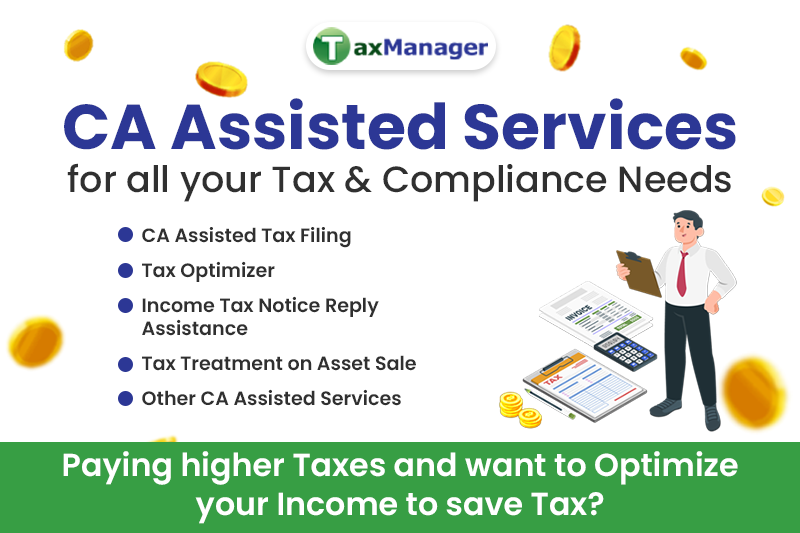- IN THE NEWS X
- It’s time to clear your advance tax liability
- Seniors need to submit Forms 12BBA, 15G, 15H to save on TDS: Experts
- How investing in 54EC bonds can help you save tax on long-term gains
- New income tax forms are out for new assessment year 2022-23. Find out which one you should use
- New ITR forms need income disclosure from foreign retirement a/cs
- Why is March 31 an important date for taxpayers? Find out
- Not filed ITR yet? Face penalty or even jail term, say analysts
- March 15 Is The Last Date To Pay Advance Tax: Time To Clear Your Liability
- It's time to deduct TDS if rent exceeds Rs 50,000, say analysts
- Clarification on capital gains tax on early redemption of Sovereign Gold Bonds is required – Here’s why
- Second amendment to LLP Rules will ease procedural burden: Experts
- Three Things To Keep In Mind Before Investing In RBI’s Sovereign Gold Bonds
- Tackle low liquidity in sovereign gold bonds by laddering, say analysts
- CBDT, tax tools make e-filing of I-T returns simpler
Unlocking Tax Savings: Beyond Section 80C - A Comprehensive Guide to Tax-saving Options
Written by Gagandeep Arora - Printed on - Date - 25th Oct 2023
Tax saving is a top priority for individuals seeking to minimise their income tax liability. While Section 80C is one of the most popular avenues for tax savings in India, it's essential to explore other tax-saving options available under different sections of the Income Tax Act. In this comprehensive guide, we'll delve into various tax-saving instruments, their limits, and eligibility criteria, helping you maximise your tax savings and wealth accumulation.
Section 80C: The Cornerstone
Section 80C is the cornerstone of tax-saving investments, offering a plethora of options for individuals looking to reduce their tax liability. Contributions made to various financial instruments under this section are eligible for deductions up to ₹1,50,000, making it a favoured choice for many. Notable tax-free investments under Section 80C include:
Public Provident Fund (PPF) Contributions
Five-Year Term Deposits
Equity-Linked Savings Schemes (ELSS)
However, there's a catch: the total exemption limit under Section 80C is ₹1,50,000. To enhance your tax-saving endeavours, you can consider adding National Pension Scheme (NPS) investments under Section 80CCD, which provides an additional ₹50,000 deduction, increasing the total deduction to ₹2 lakhs.
Going Beyond Section 80C: Exploring Other Tax-saving Options
Beyond Section 80C, several other sections of the Income Tax Act offer tax-saving exemptions. Let's explore these lesser-known avenues, each catering to different financial needs and circumstances.
Section 80CCD: National Pension Scheme (NPS)
Eligibility: Contributions to NPS by employees, employers, or voluntary self-contributions are eligible for deductions. Section 80CCD allows an additional deduction of ₹50,000 for self-contributions to NPS or Atal Pension Yojana under Section 80CCD(1b).
Section 80D: Health Insurance Premiums
Exemption Limit: Varies based on coverageEligibility: Health insurance premiums are deductible for individuals, their families, and parents. The limit varies based on the type of coverage, ranging from ₹25,000 to ₹1,00,000. An additional ₹5,000 deduction is available for health check-up expenses under Section 80D.
Section 80DD: Expenses on Handicapped Dependents
Deduction Limit: ₹75,000 (40% to 80% disability) / ₹1,25,000 (above 80% disability)Eligibility: Individuals, Hindu Undivided Families (HUFs), and individuals paying for a disabled family member's treatment can claim deductions. The limit depends on the percentage of disability.
Section 80DDB: Treatment of Specified Illnesses
Deduction Limit: ₹40,000 (₹1,00,000 for senior citizens)Eligibility: Taxpayers can claim deductions for the treatment of specified diseases, such as malignant cancers, chronic renal disease, AIDS, and neurological diseases. The limit varies based on the age of the taxpayer.
Section 80E: Education Loan Interest Payment
Deduction Limit: No limitEligibility: The interest portion of education loan EMIs is deductible, with no maximum amount. However, the loan must be taken for higher education, and a bank certificate separating principal and interest portions is required.
Section 80EE: Home Loan Interest Payment for First-time Homeowners
Deduction Limit: ₹50,000, plus benefits from Section 24(b)Eligibility: First-time homebuyers can claim additional interest benefits on home loan EMIs if the property value is below ₹45 lakh. This can lead to substantial tax savings, in addition to Section 80C deductions.
Section 80G: Donations to Approved Charitable Institutes
Deduction Limit: No limitEligibility: Taxpayers can claim deductions on contributions to charitable organisations. Cash donations up to ₹2,000 per year are exempt, while larger donations must be made through registered charitable organisations.
Section 80GG: Rent Paid by Employees Without HRA
Deduction Limit: Calculated based on specific conditionsEligibility: Employees not receiving House Rent Allowance (HRA) can claim exemptions based on the lower of three criteria: ₹5,000 per month, 25% of total annual income, or 10% of the basic annual income.
Section 80GGA: Donations for Scientific Research and Rural Development
Deduction Limit: No limitEligibility: Taxpayers can claim deductions on donations made for scientific research and rural development. These deductions can be up to 100% of the amount spent, provided they are made through a bank account and documented.
Section 80GGB and 80GGC: Donations Made to Political Parties and Electoral Trusts
Deduction Limit: No limit (subject to certain conditions)Eligibility: Indian companies can claim deductions under Section 80GGB for contributions to political parties or electoral trusts. Section 80GGC allows individuals, Hindu Undivided Families (HUFs), firms, AOPs, BOIs, and Artificial Juridical Persons to make contributions, with certain restrictions.
Section 80TTA and 80TTB: Saving Account Interest
Deduction Limit: ₹10,000 (₹10,000 for senior citizens under 80TTB)Eligibility: Taxpayers can claim deductions on savings account interest income up to ₹10,000 (or ₹10,000 for senior citizens). This benefit does not apply to interest earned on fixed deposits (FDs), recurring deposits (RDs), and corporate bonds.
Section 80U: Handicapped Taxpayers
Deduction Limit: ₹75,000 (40% to 80% disability) / ₹1,25,000 (above 80% disability)Eligibility: Handicapped individuals certified with a disability by a registered medical authority can claim tax waivers. The deduction varies based on the percentage of disability.
In addition to these sections, there are more avenues to explore, such as Section 24(b) for home loan interest, Section 10(13A) for House Rent Allowance, and various other exemptions for specific situations.
Conclusion
Making the right mix of investments not only helps to save tax but to ensure right returns at the right time While Section 80C is a pivotal tool for tax savings, it's crucial to explore other sections of the Income Tax Act to maximize your tax benefits. Each section caters to different financial needs and offers the potential for significant savings. By leveraging these tax-saving options, you can not only reduce your tax liability but also enhance your overall wealth accumulation. In conclusion, don't rely solely on Section 80C for tax savings. Discover the myriad of opportunities available under the Income Tax Act and make informed financial decisions to secure your financial future.











